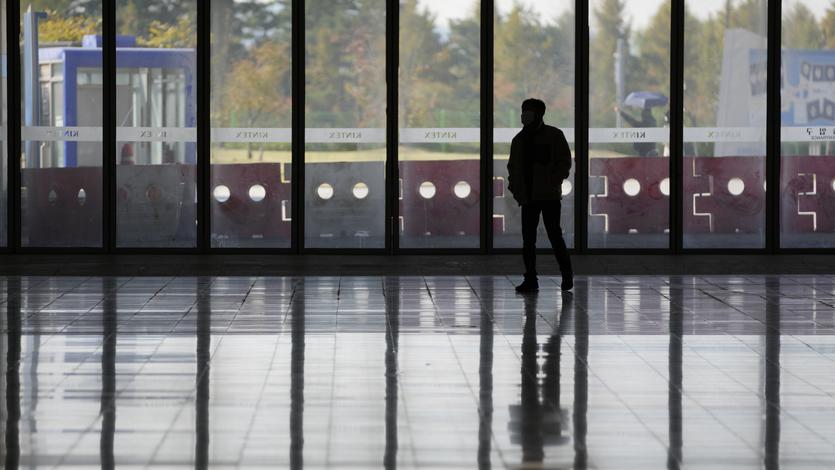 A visitor wearing a face mask to help curb the spread of the coronavirus walks at an exhibition hall in Goyang, South Korea, Oct 20, 2021. (LEE JIN-man / AP)
A visitor wearing a face mask to help curb the spread of the coronavirus walks at an exhibition hall in Goyang, South Korea, Oct 20, 2021. (LEE JIN-man / AP)
AMMAN / ANKARA / BANGKOK / CANBERRA / JAKARTA / MUMBAI / SEOUL / WELLINGTON - South Korea imposed stricter measures on Monday to contain growing coronavirus infections and the Omicron variant, leaving some foreign residents vaccinated overseas effectively barred from places such as restaurants, cafes and cinemas.
South Korea recognizes the vaccination status of Korean citizens who were vaccinated overseas but not foreigners, unless they entered the country under a quarantine exemption.
Some foreign residents, particularly from Europe and the United States, were vaccinated earlier in the year when South Korea had not yet made vaccines available and were not eligible for the quarantine exemptions that were extended to certain people in business, education or for humanitarian reasons.
It is unclear how many people are affected but the problem has caught the attention of several foreign embassies, which have been lobbying unsuccessfully for weeks for a change.
The Korea Disease Control and Prevention Agency says the policy affects a small number of people and is necessary given rising COVID-19 cases.
Australia
Australia's medical regulator, the Therapeutic Goods Administration, on Sunday provisionally approved Pfizer's coronavirus vaccine for children aged between 5 and 11.
Australian Health Minister Greg Hunt said the federal government now expects the vaccine rollout for that cohort to start on Jan 10 pending approval from the Australian Technical Advisory Group on Immunization
Health Minister Greg Hunt said the federal government now expects the vaccine rollout for that cohort to start on Jan 10 pending approval from the Australian Technical Advisory Group on Immunization (ATAGI).
"The vaccine dose approved by the TGA for children aged 5 to 11 is the same safe and effective vaccine used for other age cohorts, however is one-third the dose approved for those aged 12 and over," according to a media release from Hunt.
There are approximately 2.3 million Australians in the 5-11 age bracket.
As of Saturday, about 88 percent of Australians aged 16 and over and 67.5 percent of 12-15 year-olds were fully vaccinated against COVID-19.
On Sunday, Australia reported more than 1,200 new locally-acquired coronavirus cases and eight deaths as the country continues to battle the third wave of infections.
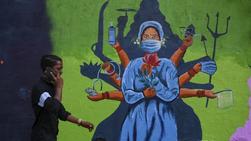 A man walks past a wall mural depicting a health worker as the Hindu Goddess Durga to spread awareness about the COVID-19 coronavirus in Mumbai on Nov 17, 2021. (PUNIT PARANJPE / AFP)
A man walks past a wall mural depicting a health worker as the Hindu Goddess Durga to spread awareness about the COVID-19 coronavirus in Mumbai on Nov 17, 2021. (PUNIT PARANJPE / AFP)
India
India's tally of reported cases of the heavily mutated Omicron variant of the coronavirus rose to 12 on Sunday after the state of Maharashtra said it had detected seven new cases.
Local media also said a new case had been reported in New Delhi.
India expects Omicron, which scientists say appears to be the most contagious variant so far, to be less damaging than the currently dominant Delta, which caused a devastating wave of infections in March and April.
The federal health ministry said 50 percent of India's adult population of 950 million were now fully vaccinated.
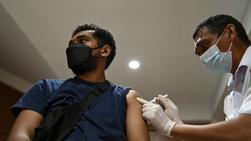 A youth receives a dose of the Sinovac vaccine against COVID-19 coronavirus at a convention hall in Banda Aceh on Oct 12, 2021. (CHAIDEER MAHYUDDIN / AFP)
A youth receives a dose of the Sinovac vaccine against COVID-19 coronavirus at a convention hall in Banda Aceh on Oct 12, 2021. (CHAIDEER MAHYUDDIN / AFP)
Indonesia
Indonesia on Sunday confirmed 196 new COVID-19 cases, raising its tally of infections to 4,257,685, according to the country's Health Ministry.
The ministry reported that the death toll from the virus in the country rose by four to 143,867, while 298 more people recovered during the past 24 hours, bringing the total number of recoveries to 4,106,292.
Indonesia has so far administered over 242.68 million doses, including the third booster jabs.
The Indonesian government aims to vaccinate 208.2 million people in the country.
The restrictions imposed on the islands of Java and Bali will end on Dec 13, while as for those regions outside Java and Bali, the curbs are set to end on Dec 6.
READ MORE: Indonesia speeds up vaccination amid concern over COVID resurgence after holidays
Japan
Japanese Prime Minister Fumio Kishida pledged to stay alert to the dangers of the coronavirus in his first policy speech to parliament since taking office in September, as a poll showed broad public support for his ban on new entry by foreigners.
“Coronavirus infections have eased in Japan,” he said Monday at the opening of an extra session. “But some countries in Europe where vaccinations are widespread are still seeing record numbers of cases,” he said, adding: “we must be prepared for the worst-case scenario.”
The public appears to want swift action to prevent the Omicron variant from spreading in Japan. A media poll over the weekend by the Yomiuri newspaper found that almost 90 percent of respondents approved of the government’s decision to close Japan’s borders to new entry by foreigners over concerns about omicron, which some reports say is more contagious than previous variants.
Jordan
A Jordanian court sentenced five senior health officials to three years in jail on Sunday for causing the death of 10 COVID-19 patients following an oxygen outage in a major state hospital, state media said.
The court found the former director of the state hospital in Salt, a city west of the capital, and four of his senior aides responsible for the deaths, the media said. The patients, who were being treated in the hospital, died in March when staff failed to act after oxygen ran out in a COVID-19 ward for nearly an hour.
Since the incident, the authorities have dismissed scores of officials in state hospitals in a campaign to curb mismanagement and perceived corruption.
Jordan on Sunday reported 46 COVID-19 deaths and 4,555 new cases, increasing the caseload since the start of the pandemic to 975,956.
It added that 4,324 recoveries were registered in hospitals and home quarantine on Sunday, bringing the total number of recoveries to 903,088.
The total number of Jordanians who received the first dose of COVID-19 vaccine has reached 4,174,421, and 3,776,263 of them have got their second shot.
New Zealand
New Zealand has secured supplies of another medicine to treat COVID-19, Health Minister Andrew Little said on Monday.
In October, New Zealand was one of the first countries in the world to make an advance purchase of a promising new antiviral drug, molnupiravir, Little said in a statement.
The national drug-funding agency Pharmac has secured from Pfizer 60,000 courses of another antiviral medicine which, like molnupiravir, can be taken as a tablet and used to stop people with mild symptoms becoming very sick, Little said.
Alongside vaccinations, hospital treatments are already reducing the likelihood of people needing intensive care unit care, with the ICU rate in the largest city Auckland dropping to 3 percent of hospitalizations, down from 5.7 percent previously, he said.
The government has made sure Pharmac can continue to secure early access to new and promising COVID medicines as soon as possible, Little said.
The Pfizer anti-viral is expected to be delivered to New Zealand in April, once approved by MedSafe.
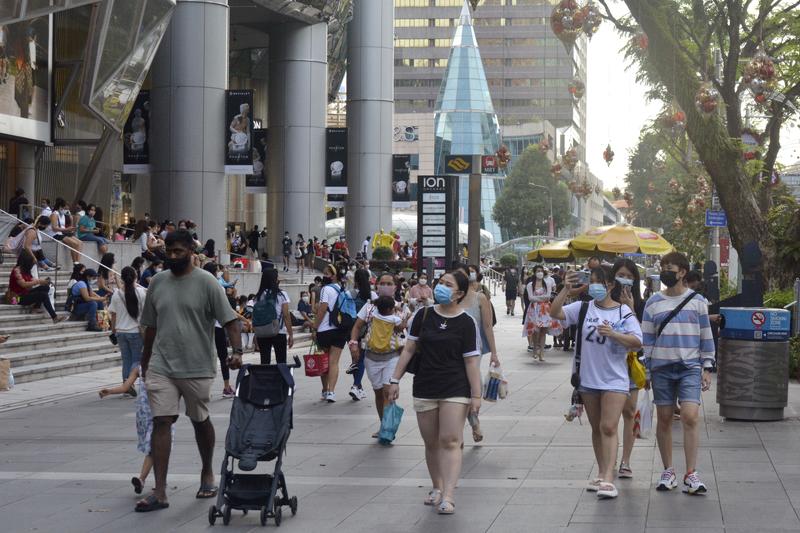 People wearing protective face masks walk along the Orchard Road shopping area in Singapore on Nov 28, 2021. (ANNABELLE LIANG / AP)
People wearing protective face masks walk along the Orchard Road shopping area in Singapore on Nov 28, 2021. (ANNABELLE LIANG / AP)
Singapore
Rapid antigen tests are effective in detecting Omicron infections and so will remain part of Singapore’s arsenal for dealing with the new variant and pandemic, the city-state’s health ministry said.
Singapore has been closely monitoring studies on the sensitivity of rapid antigen, or ART, tests to Omicron
Singapore has been closely monitoring studies on the sensitivity of rapid antigen, or ART, tests to Omicron, the new coronavirus strain first identified in southern Africa that is now being detected in other countries around the world. The analysis so far has indicated that, in addition to PCR tests, ARTs can also be used to unearth omicron, according to a statement out Sunday.
Singapore has been using ARTS to resume some large-scale events, including the conferences the city was a hub for before the pandemic. From this week, it will also require travelers coming in via the city’s vaccinated travel lanes to be rapid tested on a daily basis using ARTs.
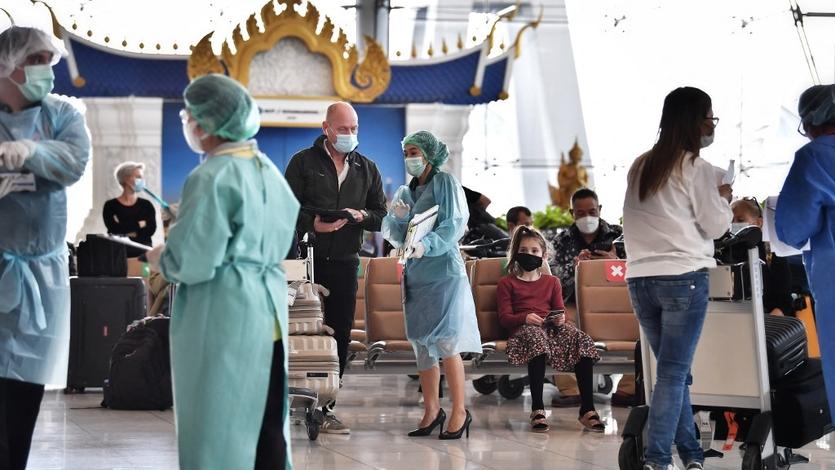 International visitors await instructions from health officials inside the arrival terminal at Suvarnabhumi International Airport as Thailand welcomes the first group of vaccinated tourists without quarantine in Bangkok on Nov 1, 2021. (LILLIAN SUWANRUMPHA / AFP)
International visitors await instructions from health officials inside the arrival terminal at Suvarnabhumi International Airport as Thailand welcomes the first group of vaccinated tourists without quarantine in Bangkok on Nov 1, 2021. (LILLIAN SUWANRUMPHA / AFP)
Thailand
Thailand has detected its first case of the Omicron coronavirus variant in a US citizen who had traveled to the country from Spain late last month, a health official said on Monday.
The confirmed case in the man, who had arrived on Nov 29, makes Thailand the 47th country to have found the new variant, Opas Karnkawinpong, Director-General of the Department of Disease Control, told a news conference.
"This first confirmed case of Omicron variant is a 35-year-old man who is a US citizen who lived in Spain for a year," Opas said adding that the patient had mild symptom.
Thailand banned travelers from eight African countries including Botswana, Eswatini, Lesotho, Malawi, Mozambique, Namibia, South Africa and Zimbabwe at the start of December amid concerns about the Omicron variant.
Turkey
Turkey on Sunday reported 19,357 new COVID-19 cases, raising its total tally of infections to 8,901,117, according to its health ministry.
The death toll from the virus in Turkey rose by 185 to 77,830, while 24,278 more people recovered in the last 24 hours.
A total of 350,937 tests were conducted over the past day, the ministry said.
More than 56.37 million people have received their first doses of vaccines, while over 50.65 million had their second doses. Turkey has so far administered over 120.91 million doses including third booster jabs.


